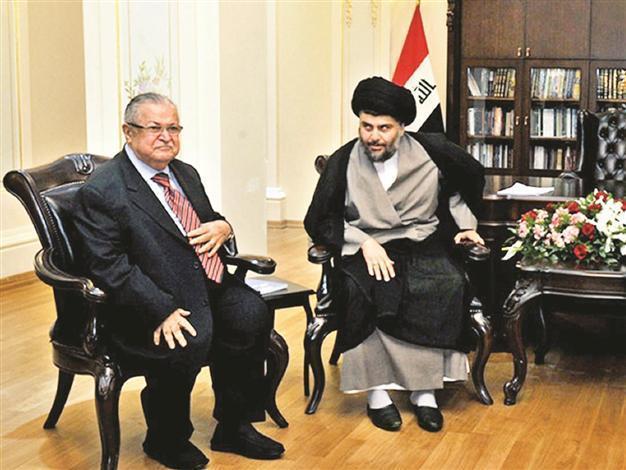Talabani rebuffs move to unseat PM
BAGHDAD

Iraqi President Talabani (L). AFP photo
A broad alliance seeking to unseat Iraq’s prime minister on May 30 failed to persuade the country’s president to make a first move by calling a parliamentary no-confidence vote against the government, a lawmaker has said.Iraq’s Shiite-dominated ruling coalition is becoming increasingly shaky. One coalition member, the heavily Sunni al-Iraqiya movement, has long complained about being shut out of decision-making. Recently, two other groups that Prime Minister Nouri al-Maliki had courted successfully, Kurds and the hard-line Shiite followers of prominent cleric Muqtada al-Sadr, have also threatened to defect.
On May 30, Iraqi President Jalal Talabani held a round of meetings with Kurdish, Sunni and Sadrist politicians in Sulaymaniyah.
“They could not persuade the president to send a message to Parliament to hold a vote of no-confidence,” The Associated Press quoted Kurdish lawmaker Mahmud Othman as saying. He said Talabani would prefer to convene talks among all of the coalition members to resolve their differences. Talabani later issued a vague statement, saying he remained committed to the constitution. However, the Sunni-backed al-Iraqiya bloc, led by Ayad Allawi, said Talabani agreed to submit a request to the Parliament to withdraw confidence from al-Maliki if the sides that attended the meeting managed to gather the signatures of an absolute majority, according to Anatolia news agency.
Iranian pressure
Even if a no-confidence vote were held, it is not clear if al-Maliki’s opponents could muster the absolute majority needed, or 164 of Parliament’s 325 members, to bring down the government. Al-Sadr said that his parliamentary bloc would back a motion of no confidence if that gave it the support of a majority of lawmakers. “I promised my partners that if they got 124 votes, I will complete the 164 votes,” he added, referring to the 40 MPs who belong to his parliamentary bloc.
Earlier on May 30, two senior politicians said Iraq’s powerful Shiite neighbor, Iran, had stepped up efforts to protect al-Maliki. “There is some Iranian pressure on the president not to send the letter to Parliament [requesting the no-confidence vote] and to support al-Maliki,” said a lawmaker from al-Maliki’s political bloc, speaking on condition of anonymity. Talabani is a Kurd, but has close ties to Iran.
Bombs hit Baghdad
A senior Sadrist said al-Maliki is still seen by the movement as the best option, despite growing concerns that he is amassing power. Iran’s top Shiite cleric, Grand Ayatollah Kazim al-Haeri, recently sent a message to al-Sadr urging him to avoid splitting Iraq’s Shiites, said the Sadrist, who also spoke on condition of anonymity. “There is a problem because the downfall of al-Maliki would create rifts among Shiites,” said the Sadrist politician. As al-Maliki’s opponents are trying to bring him down, a spate of bombings in Baghdad yesterday killed at least 16 people and wounded dozens more.
Roadside bombs and explosives-packed cars detonated across a half-dozen neighborhoods in the north, south and west of Baghdad. Overall, 16 people were killed and at least 56 others wounded in the attacks.
The deadliest attack took place in the north Baghdad neighborhood of Shuala, where a car bomb killed at least 13 people and wounded 32 others, medical officials said. Separate bombings also struck Al-Amriyah, Ghazaliyah and Yarmuk in west Baghdad, and Dora and Saidiyah in the south of the capital.
















